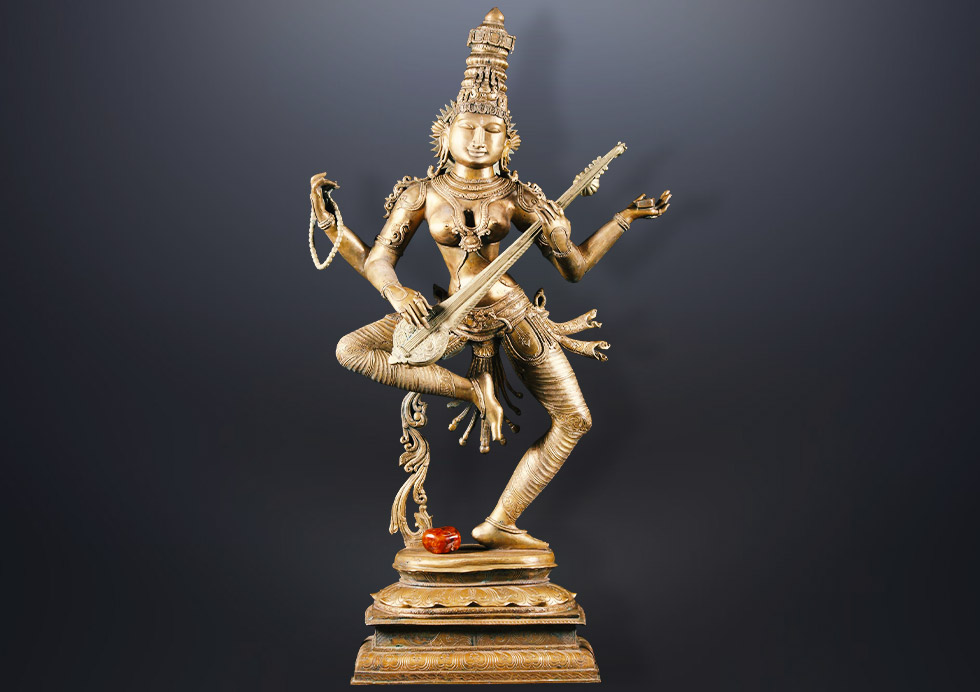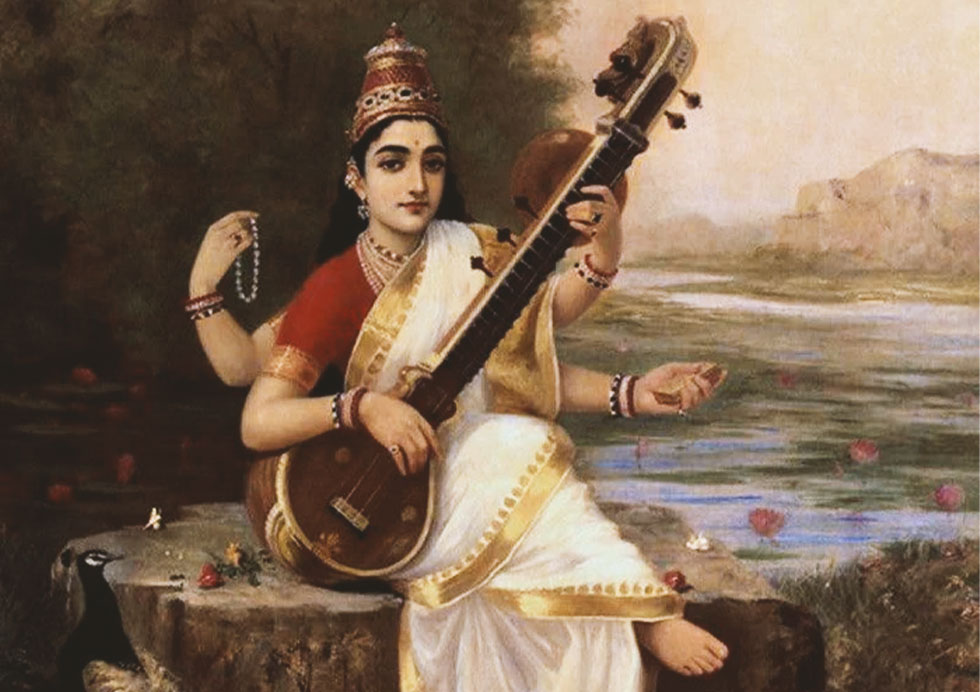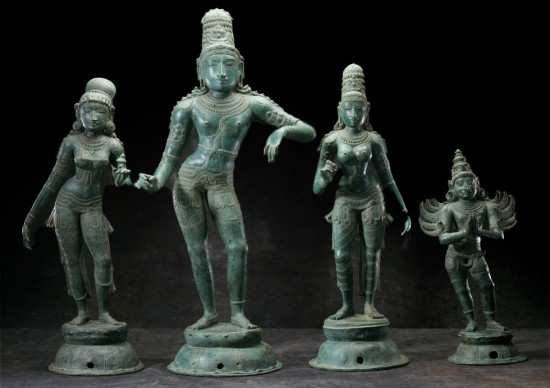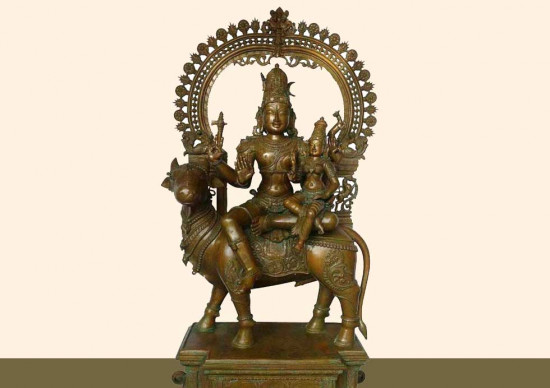
Devi Saraswati, the beautiful goddess of knowledge, music, arts, and wisdom, is one of the most revered deities in Hinduism. Her name originates from the Sanskrit words "sara" which means "essence" and "sva" which means "self"; thus, Goddess Saraswati embodies the essence of the self. She is often depicted as a beautiful woman dressed in white, seated on a white lotus flower, playing a veena (lute). Her four arms represent the four aspects of knowledge: speech, music, wisdom and the power of discrimination.
Devi Saraswati is one of the Tridevi, the three supreme goddesses of Hinduism, along with devi Lakshmi, the goddess of prosperity, and devi Parvati, the goddess of power. She is also considered a pan-Indian deity, worshiped not only by Hindus but also by Jains and Buddhists.
Devi Saraswati is a popular subject of Indian art. She is typically depicted seated on a white lotus flower, playing a veena and holding Veda’s in her hands. Her white attire symbolizes purity, and the lotus flower represents knowledge and enlightenment. Her four arms represent the four aspects of knowledge: speech, music, wisdom and the power of discrimination.
Devi Saraswati is worshiped by students, teachers, artists, and anyone seeking knowledge or creativity. She is especially invoked during the festival of Vasant Panchami, which marks the beginning of spring. On this day, people worship Saraswati by placing books, musical instruments, and writing implements at her feet.
Birth of Goddess Saraswati
There are several different accounts of Goddess Saraswati's birth, each offering unique perspectives on her divine origins. One of the most common narratives places her creation within the cosmic dance of the Hindu Trinity. According to this tale, Brahma, the creator god, felt a deep desire for knowledge and wisdom. To fulfill this yearning, he exhaled a divine breath, and from this breath emerged Goddess Saraswati.
Another version of her birth story links her to the primordial waters. It is said that Saraswati was born from the cosmic ocean, symbolizing the purity and clarity of knowledge. Her emergence from the waters signifies her connection to the source of all creation and the sustenance of life.
Another version of her birth story links her to the primordial waters. It is said that Saraswati was born from the cosmic ocean, symbolizing the purity and clarity of knowledge. Her emergence from the waters signifies her connection to the source of all creation and the sustenance of life.

Some Puranas, ancient Hindu scriptures, associate Saraswati's birth with the concept of sound. They describe her as arising from the divine syllable "Om," the sacred sound that is considered the origin of all creation. This connection to sound highlights Saraswati's role as the goddess of speech, music, and the arts.
Regardless of the specific details, these birth stories all emphasize Saraswati's divine nature and her association with knowledge, wisdom, and creativity. Her origins reflect the profound importance of these qualities in the Hindu worldview.
Regardless of the specific details, these birth stories all emphasize Saraswati's divine nature and her association with knowledge, wisdom, and creativity. Her origins reflect the profound importance of these qualities in the Hindu worldview.
The Iconography of Goddess Saraswati
Goddess Saraswati, the Hindu deity of knowledge, music, and arts, is often depicted in a distinctive and symbolic manner. Her iconography reflects her divine attributes and the concepts she represents.
Common Attributes:
- White Color: Saraswati is typically portrayed wearing white, which symbolizes purity, knowledge, and enlightenment.
- Lotus Flower: She is often seated on a white lotus flower, a symbol of creation, purity, and detachment.
- Veena: The goddess is frequently depicted playing a veena, a stringed instrument that represents music, knowledge, and the power of speech.
- Four Arms: Saraswati usually has four arms, each holding a symbolic object:
- Rudraksha Mala: A prayer bead used for meditation and spiritual practices.
- Lotus Flower: A symbol of purity and creation.
- Abhaya Mudra: A gesture of protection and reassurance.
- Varada Mudra: A gesture of granting boons and blessings.
- Peacock: The peacock is often associated with Saraswati as a symbol of beauty, grace, and knowledge.
Stories Related to Goddess Saraswati

One of the most common tales describes Saraswati as emerging from the breath of Brahma, the creator god. This symbolizes the divine origin of knowledge and wisdom. Another story links Saraswati to the cosmic ocean, representing her connection to the source of all creation.
The Defeat of Vritra
Once upon a time, there was a powerful demon named Vritra who spread darkness and ignorance everywhere. This made the world a very unhappy place. Indra, the king of the gods, knew he needed help to defeat Vritra and bring back light and knowledge.
Indra asked Goddess Saraswati for her help. Saraswati, who is known for her wisdom and guidance, gave Indra her blessings. With Saraswati’s support, Indra was able to fight Vritra and win the battle.

The Creation of the Devanagari Script
Saraswati is often credited with creating the Devanagari script, the writing system used for most Indian languages. This act solidified her position as the patron of learning and education.
The Sage Narada's Question
Sage Narada, a renowned sage, once approached Saraswati and asked, "What is the supreme knowledge?" Devi Saraswati replied, "The supreme knowledge is to know oneself."
The Battle Between Saraswati and Lord Brahma
Another story is a competition between Devi Saraswati and Lord Brahma to determine who was the more knowledgeable. Despite their efforts, neither could outwit the other, leading to the realization that knowledge is a continuous cycle. And there is no end to learning.
Saraswati is often credited with creating the Devanagari script, the writing system used for most Indian languages. This act solidified her position as the patron of learning and education.
The Sage Narada's Question
Sage Narada, a renowned sage, once approached Saraswati and asked, "What is the supreme knowledge?" Devi Saraswati replied, "The supreme knowledge is to know oneself."
The Battle Between Saraswati and Lord Brahma
Another story is a competition between Devi Saraswati and Lord Brahma to determine who was the more knowledgeable. Despite their efforts, neither could outwit the other, leading to the realization that knowledge is a continuous cycle. And there is no end to learning.
Worship and Celebrations
Vasant Panchami, the fifth day of spring, is dedicated to Goddess Saraswati. On this day, schools and educational institutions celebrate Saraswati Puja, offering prayers and seeking her blessings for academic success and intellectual growth. Devotees also offer prayers to Goddess Saraswati on other auspicious occasions, seeking her guidance and inspiration in various fields of knowledge and creativity.
Conclusion
Goddess Saraswati is a revered deity in Hinduism, embodying the power of knowledge, wisdom, and enlightenment. Her stories and symbolism continue to inspire and captivate people across generations. By invoking her blessings, individuals seek to attain intellectual and spiritual growth, and to unlock their full potential.







